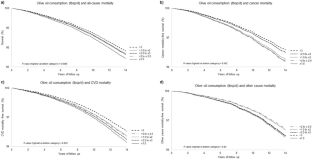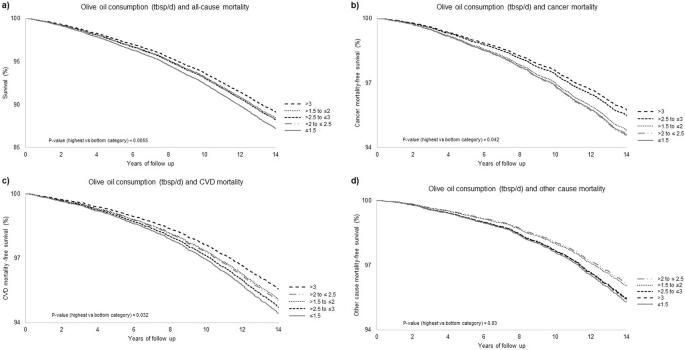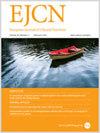Olive oil consumption is associated with lower cancer, cardiovascular and all-cause mortality among Italian adults: prospective results from the Moli-sani Study and analysis of potential biological mechanisms
IF 3.6
3区 医学
Q2 NUTRITION & DIETETICS
引用次数: 0
Abstract
Olive oil consumption has been reportedly associated with lower mortality rates, mostly from cardiovascular diseases, but its potential impact on cancer death remains controversial. Moreover, biological mechanisms possibly linking olive oil consumption to mortality outcomes remain unexplored. We longitudinally analysed data on 22,892 men and women from the Moli-sani Study in Italy (follow-up 13.1 y), to examine the association of olive oil consumption with mortality. Dietary data were collected at baseline (2005–2010) through a 188-item FFQ, and olive oil consumption was standardised to a 10 g tablespoon (tbsp) size. Diet quality was assessed through a Mediterranean diet score. Multivariable-adjusted Cox proportional hazard models, also including diet quality, were used to estimate hazard ratios (HRs) and 95% confidence intervals (CIs). The potential mediating role of inflammatory, metabolic, cardiovascular and renal biomarkers on the association between olive oil intake and mortality was evaluated on the basis of change-in-estimate and associated p values. Multivariable HRs for all-cause, cancer, cardiovascular and other cause mortality associated with high (>3 tbsp/d) versus low (≤1.5 tbsp/d) olive oil consumption were 0.80 (0.69–0.94), 0.77 (0.59–0.99), 0.75 (0.58–0.97) and 0.97 (0.73–1.29), respectively. Taken together, the investigated biomarkers attenuated the association of olive oil consumption with all-cause and cancer mortality by 21.2% and 13.7%, respectively. Higher olive oil consumption was associated with lower cancer, cardiovascular and all-cause mortality rates, independent of overall diet quality. Known risk factors for chronic diseases only in part mediated such associations suggesting that other biological pathways are potentially involved in this relationship.


食用橄榄油与降低意大利成年人的癌症、心血管疾病和全因死亡率有关:莫里-萨尼研究的前瞻性结果和潜在生物机制分析
背景据报道,食用橄榄油与降低死亡率(主要是心血管疾病)有关,但其对癌症死亡的潜在影响仍存在争议。方法我们纵向分析了意大利莫利-萨尼研究(Moli-sani Study)中 22,892 名男性和女性的数据(随访 13.1 年),以研究橄榄油消费与死亡率的关系。基线(2005-2010 年)饮食数据是通过 188 项 FFQ 收集的,橄榄油消耗量标准化为 10 克汤匙(tbsp)大小。饮食质量通过地中海饮食评分进行评估。多变量调整后的 Cox 比例危险模型(也包括饮食质量)用于估算危险比 (HR) 和 95% 置信区间 (CI)。根据估计值的变化和相关的 p 值,评估了炎症、代谢、心血管和肾脏生物标志物对橄榄油摄入量和死亡率之间关系的潜在中介作用。结果橄榄油摄入量高(3 汤匙/天)与橄榄油摄入量低(≤1.5 汤匙/天)相比,全因死亡率、癌症死亡率、心血管死亡率和其他原因死亡率的多变量死亡率分别为 0.80 (0.69-0.94)、0.77 (0.59-0.99)、0.75 (0.58-0.97) 和 0.97 (0.73-1.29)。结论橄榄油摄入量越高,癌症、心血管疾病和全因死亡率越低,这与整体饮食质量无关。已知的慢性疾病风险因素仅在一定程度上介导了这种关联,这表明这种关系可能涉及其他生物途径。
本文章由计算机程序翻译,如有差异,请以英文原文为准。
求助全文
约1分钟内获得全文
求助全文
来源期刊
CiteScore
10.60
自引率
2.10%
发文量
189
审稿时长
3-6 weeks
期刊介绍:
The European Journal of Clinical Nutrition (EJCN) is an international, peer-reviewed journal covering all aspects of human and clinical nutrition. The journal welcomes original research, reviews, case reports and brief communications based on clinical, metabolic and epidemiological studies that describe methodologies, mechanisms, associations and benefits of nutritional interventions for clinical disease and health promotion.
Topics of interest include but are not limited to:
Nutrition and Health (including climate and ecological aspects)
Metabolism & Metabolomics
Genomics and personalized strategies in nutrition
Nutrition during the early life cycle
Health issues and nutrition in the elderly
Phenotyping in clinical nutrition
Nutrition in acute and chronic diseases
The double burden of ''malnutrition'': Under-nutrition and Obesity
Prevention of Non Communicable Diseases (NCD)

 求助内容:
求助内容: 应助结果提醒方式:
应助结果提醒方式:


